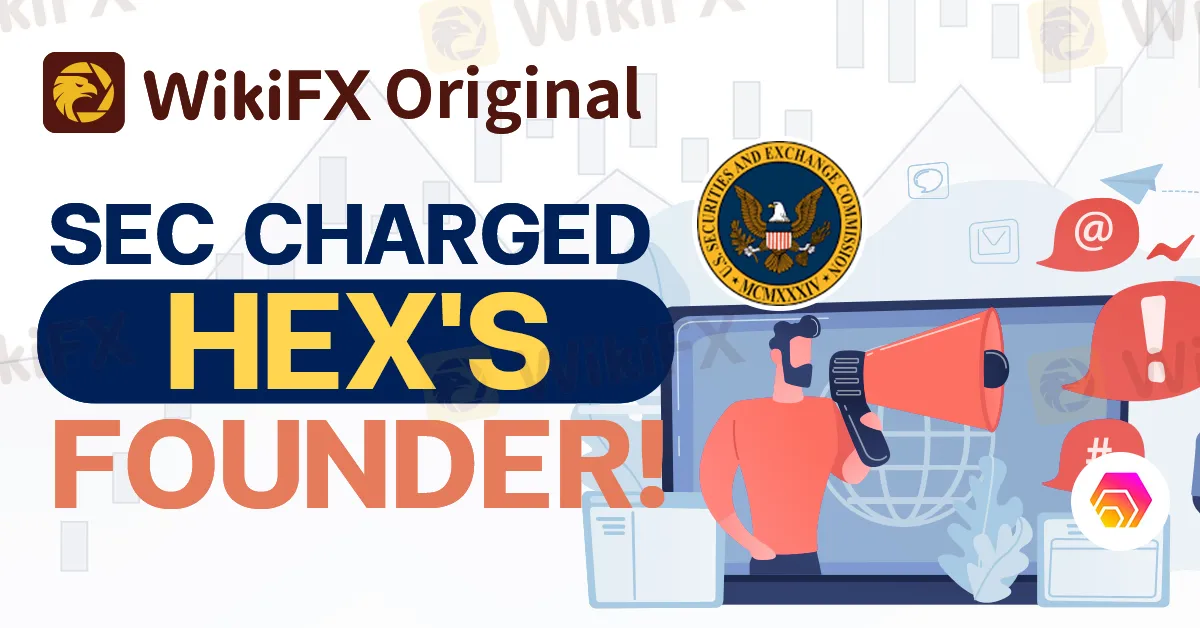简体中文
繁體中文
English
Pусский
日本語
ภาษาไทย
Tiếng Việt
Bahasa Indonesia
Español
हिन्दी
Filippiiniläinen
Français
Deutsch
Português
Türkçe
한국어
العربية
SEC Charged HEX’s Founder
Abstract:The US Securities and Exchange Commission (SEC) has charged Hex's Founder, Richard Heart, for allegedly raising over $1 billion through unregistered offerings of crypto asset securities, marking the latest move in the regulator's crackdown on crypto exchanges in the United States.

The Securities and Exchange Commission (SEC) in the United States has escalated its crackdown on crypto exchanges, with charges being filed against Richard Heart, also known as Richard Schueler, the Founder of Hex, for allegedly raising more than $1 billion through unregistered offerings of crypto asset securities. The charges were brought before a New York district court.


According to the SEC, Heart initiated the fundraising for Hex in 2018, marketing it as the first high-yield “blockchain certificate of deposit.” He is also accused of raising funds for PulseChain, an alleged crypto asset network, and PulseX, the associated crypto asset trading platform.
The SEC asserts that all three entities, Hex, PulseChain, and PulseX, are under Heart's control. He is accused of offering investors the exchange of their digital assets for PLS and PLSX, the native tokens of PulseChain and PulseX.
The complaint claims that from December 2019 to November 2020, Heart and Hex conducted an unregistered offering of Hex tokens, collecting over 2.3 million Ethereum (ETH), including through “recycling” transactions that allowed Heart to gain control of more Hex tokens secretly. The SEC also alleges that between July 2021 and March 2022, Heart orchestrated two additional unregistered crypto asset security offerings, raising hundreds of millions of dollars more in crypto assets.
Furthermore, the SEC accuses Heart and PulseChain of misappropriating at least $12 million of investor funds, which Heart reportedly spent on luxury items such as sports cars, watches, and even a 555-carat black diamond known as “The Enigma,” reputedly the world's largest black diamond.
Heart also promoted a “staking” feature for Hex tokens, claiming they would provide returns of up to 38%. Additionally, in an attempt to evade US securities law, Heart allegedly urged investors to “sacrifice” their crypto assets instead of “investing” them in exchange for PLS and PLSX.
Eric Werner, Director of the SEC's Fort Worth Regional Office, stated that the action seeks to protect investors and hold Heart accountable for his actions.
The SEC's actions against Heart and his companies are part of its ongoing legal battle against Binance and Coinbase, two major crypto platforms accused of offering unregistered crypto asset securities. The SEC also accused Binance of mixing client funds with company resources.
In contrast, Ripple, a digital asset firm, secured a partial victory against the SEC earlier this month when a US court ruled that the token sale of XRP to retail investors on public exchanges did not violate US securities law.

Disclaimer:
The views in this article only represent the author's personal views, and do not constitute investment advice on this platform. This platform does not guarantee the accuracy, completeness and timeliness of the information in the article, and will not be liable for any loss caused by the use of or reliance on the information in the article.
Read more

European Crypto Market Shakeup: Banking Limits, Regulatory Pressures, and Exchange Survival
Portugal’s BiG bank blocks fiat transfers to crypto platforms. European crypto platforms face mounting challenges amid regulatory changes.

Top 3 U.S. Crypto Policies to Watch in 2025: What to Expect
Get ready for 2025! From stablecoin rules to SEC vs. CFTC oversight and a bold Bitcoin reserve plan, here’s what to watch in U.S. crypto policies.

What Are Indonesia's New Digital Asset Regulations?
Indonesia’s crypto rules are changing as OJK leads regulation, VAT impacts trading, and the country rises as a key global hub for digital assets.

South Korea Introduces NFT Tourism Cards for Jeju Island Visitors
Jeju Island launches NFT tourism cards for Korean visitors, offering exclusive perks to boost revisits. Part of South Korea's push for blockchain-based travel.
WikiFX Broker
Latest News
Ghana Trader Jailed for $300K Forex and Crypto Scam
US Dollar Surge Dominates Forex Market
Hong Kong Police Bust Deepfake Crypto Scam Syndicate Involving $34 Million
Is it a good time to buy Korean Won with the current depreciation?
Pepperstone Sponsored the "Aston Martin Aramco Formula One Team"
ACY Securities Integrates MetaTrader 5 to Enhnace Copy Trading Service
Soegee Futures Review: Should You Trust This Broker?
Malaysian Pilot Loses RM1.36 Million in UVKXE Investment App Scam
Indonesia officially joins the BRICS countries
Attention! Goldman Sachs Cuts Gold Target to $2910
Currency Calculator






